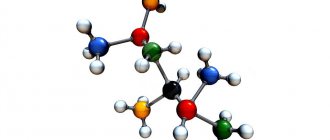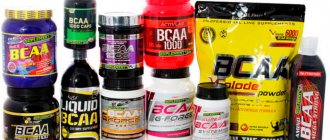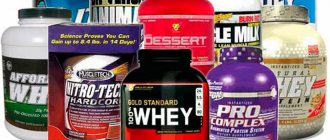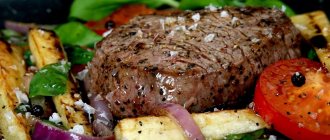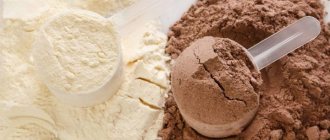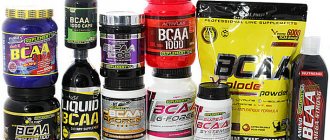Modern medicine attaches great importance to drugs based on amino acids. All biochemical systems of the body consist of these compounds, and this necessitates the need for their production (you can purchase most amino acids at the pharmacy).
The main purpose of amino acids is the synthesis of enzymes, which are natural accelerators of all chemical reactions in the body. The better and more efficiently the processes of protein synthesis occur, the more energy a person releases. It is estimated that the action of amino acids in the bodies of athletes provides about 10% of their total energy. If the muscles have exhausted their energy reserves during training, then in order to restore physical performance and progress, it is necessary to consume a significant amount of amino acids.
Some of the amino acids can influence the production of growth hormones, which makes them useful for athletes involved in strength sports. This fact was proven during the experiment: after taking L-arginine and L-ornithine, the subjects experienced a short-term but quite significant natural increase in growth hormone levels.
A strength program was written for twenty-two participants in the experiment, which lasted five weeks. One group had a certain amount of L-arginine added to their diet, while the other group took a placebo (a substance with weak chemical and anabolic activity). After completing the course of training, strength and muscle gains of all trainees were measured. The results showed that athletes who took amino acids had significantly greater gains.
About amino acids
It is known that amino acids are the main building material for protein. When protein food enters the human body, a process is launched that is responsible for the breakdown of proteins into components - proteolysis. The first enzyme released is pepsin. Thanks to its action, proteins break down into peptides. Then, in the duodenum, they are broken down into amino acids.
Of course, there are several more processes, but there is no need to delve too deeply into biology in this article. It is worth noting that amino acids obtained as a result of proteolysis are important and are responsible for performing a large number of functions: increasing endurance, tissue repair, synthesis of chemical elements that help brain cells function properly, and so on.
Of all the amino acids, three special ones can be distinguished, on which the proper growth and restoration of muscle fibers depends. More on this below. Scientists divide amino acids into two groups, namely: conditionally essential and non-essential. Each of these groups has a certain amount of organic substances, and there are 22 in total.
Essential amino acids can only be obtained from food, while others can be produced by the body itself in small quantities.
Why do muscles “burn”?
Muscle tissue is pure protein. Due to stress in the body during training, cortisol is produced, a catabolic hormone. It breaks down muscle protein into amino acids and releases glycogen stored in muscles, breaking it down into glucose for quick additional energy. In addition, increased cortisol levels activate the accumulation of subcutaneous fat and increase appetite (due to glucose entering the blood).
All sportsmen and women are afraid of cortisol (it destroys muscles!), it is a natural reaction of the body to stress - physical activity, fear, hunger and similar situations. To reduce cortisol, it is recommended to take BCAA (the three most important amino acids for the body). And also protein (protein shakes) and carbohydrates (yes, they are also required).
How to protect muscles from destruction during training?
- Eat complex carbohydrates (cereals, whole grains, legumes, mushrooms) an hour or two before training.
- Train for no more than an hour. If you need more, increase the number of workouts per week.
- Take BCAA and protein as recommended in this article.
What is this?
How to replace BCAA and what is it? This sports supplement contains leucine, isoleucine and valine - three amino acids. They constitute the basic material for building all the muscles of the body, resist the destruction of muscle tissue, have an anabolic effect and reduce the percentage of body fat. In general, a very useful thing, but only if you choose a quality product and a proven brand.
But it happens that an athlete does not want to pay extra money for additional nutrition. It is in this case that the question arises: “What to replace BCAA with?” In fact, the amino acids that make up the dietary supplement can be found in almost any meat. But this is not the only source of these substances; they are also found in plant foods.
Differences between protein and BCAA: which is better?
Protein is protein, and BCAA is amino acids. However, protein sports supplements already contain BCAA. Moreover, in a higher concentration than regular protein-containing foods. Some don't
Vegan sources do not take into account the existence of plant protein (including plant protein isolate); there is an opinion that only BCAA are available to vegans. Now you know that's not true. But which is better - protein or BCAA?
Amino acids (specifically BCAA) are used to reduce damage to muscle tissue during exercise
, providing the body with an additional source of energy.
The body's absorption of protein requires some time
for the breakdown of proteins into amino acids and their subsequent absorption. Unlike protein, BCAA are already a broken down form of protein and are absorbed much faster. Take these supplements differently.
Is it necessary to buy?

There is no global need to purchase BCAA. The human body is able to independently cope with muscle building, recovery processes, and so on. But this is only if the athlete eats rationally and properly. After all, the basis of sports results is natural and high-quality food. Supplements should be taken as a complement to the main food, but not vice versa.
A well-designed diet is something that can replace BCAA. Nutrition is more important anyway. Therefore, if an athlete does not have enough money to buy the necessary sports supplements: creatine, several types of protein, amino acids, and so on, the most correct decision would be to buy natural food. If you have enough money to buy food and supplements, then you can afford both.
BCAA in protein

Athletes who are interested in how to replace BCAA should know that the amino acids included in its composition are contained in the required amount in protein. Therefore, if you have to choose one or another supplement, it would be more correct to purchase protein. You can verify the profitability by making simple calculations. For example, let's take the popular protein powder 100% Whey Gold Standard, which costs approximately 4,500 rubles and weighs 2.27 kg.
The jar contains about 80 servings of 29.4 g each. One contains 5 g of BCAA amino acids. By making simple calculations, you can find out that one jar contains approximately 454 g of BCAA, that is, for 1 kg of such protein there are 200 g of BCAA. The cost of one kilogram of protein of this brand is about 1900 rubles. It follows that for 1900 rubles you can buy 800 g of whey protein and 200 g of BCAA.
The cost of a jar of pure amino acids (200 g) is approximately the same - 1800–2000 rubles. This makes a clear conclusion: buying one can of protein powder is more profitable than buying a can of BCAA.
How to take BCAA and protein?
By taking both products, you will get the maximum effect from your workouts, but do not mix protein and BCAA, take them separately. If you want to try one thing first and want to lose weight by removing excess fat, choose BCAA. For muscle growth or if you lack protein (check your daily caloric intake), choose protein. You can replace one of your meals with a protein shake (add a banana or berries to it, it will be tastier).
BCAA's are best taken before or immediately after a workout. Or right during it, if your workout lasts more than 40-60 minutes. Some sports sources advise taking BCAA in the morning on an empty stomach and during training; on days without training, get by with amino acids from your regular food. Be sure to study the recommendations for use, they are always indicated on the packaging, I follow them exactly.
BCAA is available in capsule, powder (powder) and liquid form. The powder sometimes has a strange taste (you can look for flavorings), capsules are easy to use, and the liquid version is absorbed the fastest. Although I haven’t seen BCAA in liquid form yet, please share if you have.
Take protein 20-30 minutes after training. If your workout lasts more than 90 minutes, add carbohydrates to your protein. Don’t forget that the protein norm is 1 gram per 1 kg of weight. If you train, increase this value to 1.5 or even 2 grams, depending on the load. This value is total, including all food for the day.
At high loads, for additional suppression of cortisol, add 8% of the daily value of carbohydrates to BCAA (regular sugar is fine). The body will receive amino acids and glucose. This will allow you to train intensely for longer without fatigue and slow down the production of cortisol. Avoid fats, they interfere with the absorption of carbohydrates. And no fruit - under load, fructose causes stomach cramps.
In food
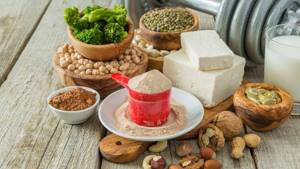
Now let's look at food products that are high in isoleucine, valine and leucine:
- Veal and beef: an excellent source of amino acids and an excellent building material for muscle tissue. In addition, this type of meat contains a fighting charge of zinc, and this in turn affects the production of testosterone.
- Chicken. What is the easiest way to replace BCAA? Of course, chicken. It is high in leucine and is also a source of protein, beloved by many athletes. In addition to breasts, you can also eat legs. They contain large amounts of tryptophan.
- Turkey. The content of amino acids is not inferior to chicken meat, but has less fat content.
- Fish. The content of BCAAs is not inferior to meat products, and cod is the champion in the amount of isoleucine, carp has a lot of leucine, and herring and perch are rich in valine. In addition, fish contains Omega-3 fatty acids, which play an important role in the body.
- Soy, like meat, contains a sufficient amount of BCAA amino acids, but soy products have one unpleasant feature - they are less absorbed by the body than the same chicken breast.
- Legumes. Peas and beans are excellent sources of essential amino acids and are an excellent meat alternative for vegetarians. In addition, they are well absorbed, have a positive effect on muscle building and contain a decent set of microelements, including zinc, so beloved by athletes.
- Cheese - almost any type of this product contains a decent amount of amino acids, the main thing is to choose low-fat varieties.
- Cottage cheese is not only a source of casein, it contains a sufficient amount of BCAA amino acids. By the way, there are much more of them in low-fat cottage cheese.
How to replace BCAA?
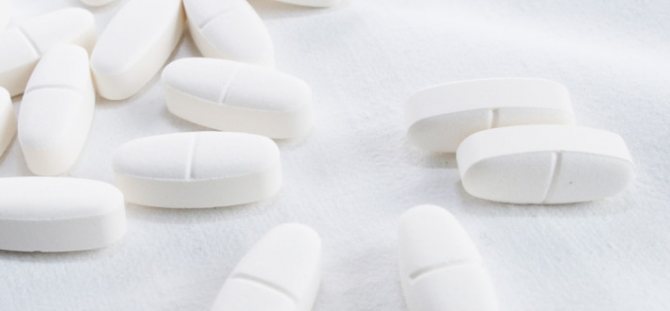
In pharmacies you can find many varieties of amino acids, among them there are also products that are found in the assortment of sports nutrition stores, but at lower prices. The most popular ones are considered:
- Glutamine. Accelerates the recovery of muscle tissue, reduces pain after training, improves immunity, and affects the level of growth hormone.
- Methionine. Helps eliminate toxins, reduces “bad” cholesterol and has a positive effect on the overall tone of the body.
- Glycine. Increases the body's resistance to mental and physical stress, calms, and helps even out sleep patterns.
- Alvizin. A solution of several essential amino acids is used to accelerate recovery processes.
- Cerebrolysin. This amino acid complex accelerates the recovery of the central nervous system, tired from working at maximum weights or competing in competitions.
- Lysine. Restores cartilage and muscle tissue, improves calcium absorption.
- Arginine. Another way to replace BCAA at the pharmacy. It has a positive effect on the nitrogen balance in the human body, increases the amount of growth hormone, and is especially useful for men.
Phenylalanine
One of the most valuable amino acids for the body is phenylalanine . It has an important effect on the body. One of its functions is to protect endorphins. These cells control pain in the body, and the presence of D- and L-phenylalanine helps relieve acute pain in the long term. This amino acid is produced naturally in the body and is a thousand times more potent than morphine. Taking a small amount of phenylalanine has a good pain-relieving effect.
Reviews

Most athletes describe their experience of consuming amino acids from the pharmacy positively. First of all, their low price is noted compared to expensive sports supplements. The first three products from the list above have proven themselves especially well. It is worth noting that many athletes use amino acids not only after training to restore the body, but also for prevention in general.
